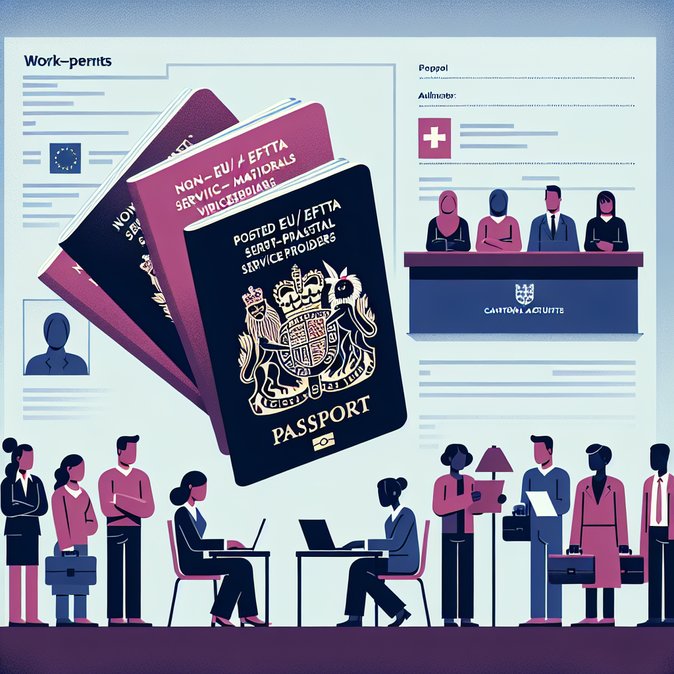
In an eagerly awaited decision for Swiss employers and foreign assignees, the Federal Council confirmed late on 26 November that next year’s national quotas for hiring skilled professionals from outside the EU/EFTA will remain exactly the same as in 2025.
That means companies will again have access to 8 500 work-permit places: 4 500 B-permits for longer-term assignments and 4 000 L-permits for short-term postings under twelve months. In parallel, the special envelope for service-providers posted from EU/EFTA member states is frozen at 3 500 permits, while the post-Brexit carve-out for UK citizens stays at 3 500 authorisations (2 100 B and 1 400 L). The quotas are set in the Ordinance on Admission, Residence and Gainful Activity (OASA) and are allocated to the cantons on a quarterly basis.
![Swiss Federal Council Keeps 2026 Work-Permit Quotas Unchanged for Non-EU Talent]()
The government opted for the status quo after consulting cantonal authorities and business federations. Although Switzerland saw net migration surge to a 17-year high in 2025—stretching housing, schools and public transport—employer groups argued that tightening the ceiling would exacerbate skills shortages in engineering, life-sciences and financial technology. The Council therefore resisted populist calls to cut allocations, but warned that cantons must scrutinise each application to ensure genuine labour-market need.
For global mobility managers, the announcement removes the year-end uncertainty that often forces companies to delay January start-dates. Organisations planning large project deployments in 2026 should, however, file applications early in the year: in 2025 the nationwide L-quota was exhausted by mid-October, forcing late-season assignees onto less flexible local-hire routes. Employers are also reminded that cantons continue to require labour-market tests for most third-country hires and that salary levels must match local benchmarks.
Practically, HR teams should update assignment costings to reflect the unchanged permit mix and build at least six weeks into lead-times for B-permits in high-demand cantons such as Zurich, Basel-Stadt and Vaud. UK-headquartered multinationals should also note that their staff still benefit from a dedicated pool until at least the end of 2026, offering a strategic advantage compared with talent sourced from the United States or India.
That means companies will again have access to 8 500 work-permit places: 4 500 B-permits for longer-term assignments and 4 000 L-permits for short-term postings under twelve months. In parallel, the special envelope for service-providers posted from EU/EFTA member states is frozen at 3 500 permits, while the post-Brexit carve-out for UK citizens stays at 3 500 authorisations (2 100 B and 1 400 L). The quotas are set in the Ordinance on Admission, Residence and Gainful Activity (OASA) and are allocated to the cantons on a quarterly basis.

The government opted for the status quo after consulting cantonal authorities and business federations. Although Switzerland saw net migration surge to a 17-year high in 2025—stretching housing, schools and public transport—employer groups argued that tightening the ceiling would exacerbate skills shortages in engineering, life-sciences and financial technology. The Council therefore resisted populist calls to cut allocations, but warned that cantons must scrutinise each application to ensure genuine labour-market need.
For global mobility managers, the announcement removes the year-end uncertainty that often forces companies to delay January start-dates. Organisations planning large project deployments in 2026 should, however, file applications early in the year: in 2025 the nationwide L-quota was exhausted by mid-October, forcing late-season assignees onto less flexible local-hire routes. Employers are also reminded that cantons continue to require labour-market tests for most third-country hires and that salary levels must match local benchmarks.
Practically, HR teams should update assignment costings to reflect the unchanged permit mix and build at least six weeks into lead-times for B-permits in high-demand cantons such as Zurich, Basel-Stadt and Vaud. UK-headquartered multinationals should also note that their staff still benefit from a dedicated pool until at least the end of 2026, offering a strategic advantage compared with talent sourced from the United States or India.










